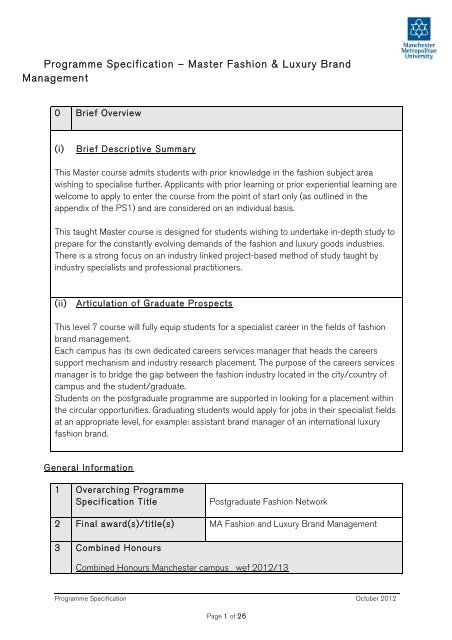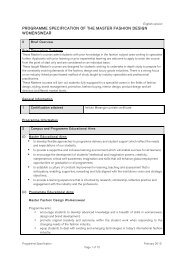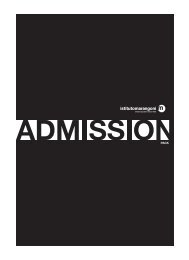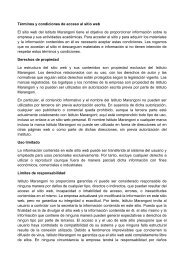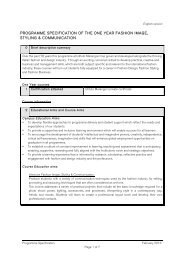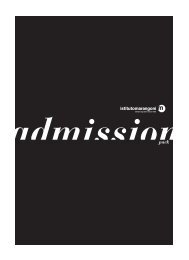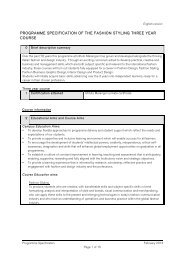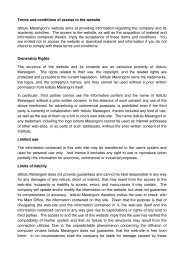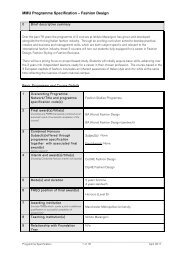Programme Specification â Master Fashion ... - Istituto Marangoni
Programme Specification â Master Fashion ... - Istituto Marangoni
Programme Specification â Master Fashion ... - Istituto Marangoni
You also want an ePaper? Increase the reach of your titles
YUMPU automatically turns print PDFs into web optimized ePapers that Google loves.
PARM1.1 <strong>Programme</strong> <strong>Specification</strong> – <strong>Master</strong> <strong>Fashion</strong> & Luxury BrandManagement0 Brief Overview(i)Brief Descriptive SummaryThis <strong>Master</strong> course admits students with prior knowledge in the fashion subject areawishing to specialise further. Applicants with prior learning or prior experiential learning arewelcome to apply to enter the course from the point of start only (as outlined in theappendix of the PS1) and are considered on an individual basis.This taught <strong>Master</strong> course is designed for students wishing to undertake in-depth study toprepare for the constantly evolving demands of the fashion and luxury goods industries.There is a strong focus on an industry linked project-based method of study taught byindustry specialists and professional practitioners.(ii) Articulation of Graduate ProspectsThis level 7 course will fully equip students for a specialist career in the fields of fashionbrand management.Each campus has its own dedicated careers services manager that heads the careerssupport mechanism and industry research placement. The purpose of the careers servicesmanager is to bridge the gap between the fashion industry located in the city/country ofcampus and the student/graduate.Students on the postgraduate programme are supported in looking for a placement withinthe circular opportunities. Graduating students would apply for jobs in their specialist fieldsat an appropriate level, for example: assistant brand manager of an international luxuryfashion brand.General Information1 Overarching <strong>Programme</strong><strong>Specification</strong> TitlePostgraduate <strong>Fashion</strong> Network2 Final award(s)/title(s) MA <strong>Fashion</strong> and Luxury Brand Management3 Combined HonoursCombined Honours Manchester campus wef 2012/13<strong>Programme</strong> <strong>Specification</strong> October 2012Page 1 of 26
PARM1.1 The University has a defined list of approved combinations available to studentsthrough the Combined Honours scheme. Each approved combination is assigned toa programme specification and to a Department, which is responsible for allprogramme management arrangements for students enrolled on that combination.Section 3 indicates all combinations available for subjects within this programmespecification and also identifies those combinations, which for which this programmespecification is specifically responsible.Combined Honours on the Cheshire campus wef 2012/13Combined Honours at MMU Cheshire is administered through a separate FacultyCombined Honours programme specification. Subject combinations, which areavailable to students are listed within that document.3a(i) Combined Honours Awardsavailable eg:• BSc/BA (Hons) AB• BSc/BA (Hons) AB and XY• BSc/BA (Hons) AB with XYNone(ii) Single Honours Awardsavailable throughCombined Honours (ieNamed Awards)None3b(iii) Approved SubjectCombinations administeredby this <strong>Programme</strong><strong>Specification</strong>(ie “home” combinations)Approved SubjectCombination administeredby other <strong>Programme</strong><strong>Specification</strong>sNoneApproved CombinationNoneHome <strong>Programme</strong><strong>Specification</strong> & Home Dept.4 Interim exitaward(s)/title(s)PG Certificate <strong>Fashion</strong> and Luxury BrandManagementPG Diploma <strong>Fashion</strong> and Luxury BrandManagement5 Mode(s)N/a<strong>Programme</strong> <strong>Specification</strong> October 2012Page 2 of 26
On successful completion of their course of study MMU graduates will beable to:• apply skills of critical analysis to real world situations within a defined range ofcontexts;• demonstrate a high degree of professionalism characterised by initiative, creativity,motivation and self-management;• express ideas effectively and communicate information appropriately and accuratelyusing a range of media including ICT;• develop working relationships using teamwork and leadership skills, recognisingand respecting different perspectives;• manage their professional development reflecting on progress and takingappropriate action;• find, evaluate, synthesise and use information from a variety of sources• articulate an awareness of the social and community contexts within theirdisciplinary field.<strong>Programme</strong> Specific OutcomesOn successful completion of the <strong>Master</strong>’s programme students will be able to:• critically evaluate current research in their specialist field of study;• select and define a research topic and implement a research plan using appropriatemethodologies;• critically analyse their results and draw logical conclusions;• exercise initiative and personal responsibility in the work environment;• carry out further independent learning or continuing professional development;• critically reflect on experience of significant managerial responsibility;• continue as a researcher in an academic or commercial setting and have thepotential to extend the bounds of knowledge in their chosen field.Also, they will have the qualities needed for employment in situations requiring theexercise of initiative and personal responsibility together with decision-making in complexand unpredictable situations.The design of the programmes is guided by the expectations of the QAA Framework forhigher education qualifications in England, Wales and Northern Ireland that on completionof a <strong>Master</strong>’s degree students should ‘typically’ be able to:• deal with complex issues both systematically and creatively, make soundjudgements in the absence of complete data, and communicate their conclusionsclearly to specialist and non-specialist audiences;• demonstrate self-direction and originality in tackling and solving problems, and actautonomously in planning and implementing tasks at a professional or equivalentlevel;<strong>Programme</strong> <strong>Specification</strong> October 2012Page 6 of 26
AssessmentThe assessment strategy for the programme has been designed to incorporate a variety ofassessment methods to enable all students to demonstrate their learning in a fair andcomprehensive manner and is in line with the Manchester Metropolitan UniversityRegulations for Taught Postgraduate <strong>Programme</strong>s of Study. A table showing differenttypes of assessment by unit is provided in Appendix V.Assessment Methods:Formative assessment is used as an interim review of student work undertaken at keypoints during particular units. It provides an indicative measure of progress, allows studentsto consider their work in relation to that of their peers, allowing students to agree with staffany adjustments that are necessary to make in order to satisfy course requirements. Theyare designed to help improve student performance. It does not contribute to the final unitmark. Formative assessment always makes reference to the learning outcomes and orassessment criteria of that unit.Summative assessment Provides an evaluation of student progress and learningduring an entire unit, generates a unit mark, constructive feedback and confirms theconditions for referral and retake.Peer and Self-assessment requires students to assess their own work and that offellow students. It encourages:• a sense of ownership of the process of assessment;• assists the student to become an autonomous learner;• helps to develop a range of transferable skills;• makes assessment part of the learning process rather than an adjunct to it.Portfolio Assessment is used to assess a variety of projects that have been developedthroughout the unit.Practical and Class Based Projects – allow the students to demonstrate theirunderstanding of a specific subject area and application of practical areas of theprogramme.Written Reports are required in some study areas, where a clear and structured brief isprovided and the students are asked to submit work to be marked independently andanonymously by staff.Formal Examinations – will be used in some subjects to permit students todemonstrate their understanding of a subject within a constrained timeframe.<strong>Programme</strong> <strong>Specification</strong> October 2012Page 11 of 26
25 <strong>Programme</strong> Structure(i)Engagement with the University’s Uniwide Language ProvisionNot relevant for Postgraduate or Externally Validated programmes(ii)Structures, levels, credits, awards, curriculum map of all units(identifying core/option status, credits, pre or co-requisites) potentialentry/exit points and progression/award requirementsStudents are able to study these two programmes on a full-time basis only.MA <strong>Fashion</strong> and Luxury Brand ManagementSuccessful students on the <strong>Master</strong>’s course who exit after the taught part of theprogramme (120 credits) will be awarded an interim award of Postgraduate Diploma intheir specialist area.But it is expected that students will continue on to the final stage of the programme,complete Dissertation and be awarded the <strong>Master</strong>’s degree in their area.In accordance with MMU AP(E)L scheme students cannot enter the course after the 50%of the course has been taught.<strong>Fashion</strong> and Luxury Brand Management <strong>Master</strong>’s Degree: Full-time, Level 7Core UnitsCode Status Unit Title No ofcredits31FMM003 Core <strong>Fashion</strong> Marketing Management 2031CIM001 Core Contemporary Issues In <strong>Fashion</strong> 2031RMM002 Core Research Methods 2031LMM001 Core Luxury Management 2031SBM001 Core Strategic Brand Management 2031PCM001 Core Product Creativity and Innovation 2031DSM001 Core Dissertation 60Interim Awards:On successful completion of 60 credits, within this course only, students may leave theprogramme with the interim award:<strong>Programme</strong> <strong>Specification</strong> October 2012Page 13 of 26
Postgraduate Certificate <strong>Fashion</strong> and Luxury Brand ManagementOn successful completion of the first 120 credits, within this course only, – interim exitaward:Postgraduate Diploma <strong>Fashion</strong> and Luxury Brand ManagementOn successful completion of Level 7 with 180 credits – Final exit award:<strong>Master</strong>’s <strong>Fashion</strong> and Luxury Brand Management26 Personal Development PlanningThe most widely accepted definition of PDP is that of the Quality Assurance Agency, whichdefines PDP as “a structured and supported processes to develop the capacity ofindividuals to reflect on their own learning and achievement, and to plan for their ownpersonal and educational and career development.” (QAA 2001).PDP offers a structured way to reflect on what the student is good at and what needs todevelop further.It encourages students to rate their current skill levels attained at the institute and learnedfrom different situations and environments including external studies, part time work,voluntary work and other social activities.This programme conforms to MMU’s Faculty of Art and Design’s PDP Framework, wherebyPDP is viewed as a process that is embedded within the curriculum.It is an ongoing process of students reflecting on their development as learners and ontheir aspirations for their future learning and professional practice.PDP/Individual Development Tutorial.All students on all courses are required to participate in PDP.There are two PDP tutorials for each student within the course given by the Key Tutor.Students prepare themselves for this tutorial through a reflective survey of their learningjournal that is supported and guided by a set of questions from their Key Tutor. Initially theywill be asked to reflect on their existing skills and determine where their strengths lie. Thenthey will be assisted in determining their development needs and setting somedevelopment goals.Success in achieving these goals will be determined in a variety of ways: through theirstudies; extra-curricular activities etc. and, with the support of the Key Tutor, the studentwill be able to recognise and record these successes, setting further goals as required.At the end of the course all students are given the opportunity to meet with the campuscareer service manager and discuss their future employment goals.<strong>Programme</strong> <strong>Specification</strong> October 2012Page 14 of 26
27 Placement and Work-based LearningThe structure and delivery of the programme allows for the formal provision of placementsupported by campus dedicated Careers Services Manager and Academic PlacementTutor.The purpose of the Careers Services Manager is to bridge the gap between the fashionindustry located in the city/ country of campus and once the student has graduated. It isthe role of the Career Services Manager to build and expand on industry relationships intheir city.All students are supported by a placement handbook, lectures, PowerPoint presentationsand notes on placement and employment, the nature of the fashion industry, preparation ofCVs, cover letter writing, developing and preparing a portfolio in line with a job interviewand how to adopt interview skills.Students are supported to find a relevant industry research placement opportunity form thebeginning of the course in order to research within the dissertation unit.Students failing to find an appropriate placement opportunity will be expected to undertakea longer dissertation as required in the unit specification.Career Support Seminars & Workshops, proposals:Career service manager supported by the placement tutor and experts from industry andrecruitment will deliver workshops and seminars. A Placement handbook has also beencreated as a further support for students.Students are required to attend all seminars to gain full support before taking up industryplacement opportunities.Term 11 st SEMINAR• Introduction on internships, legal and academic requirements• Researching career opportunities• Planning placement2 nd SEMINARGuidelines on• writing a cv appropriate to industry field• covering letter writing workshop• appropriate methods of contacting and entering into discussions with industrypartnersOne to one appointments with the career service team to understand student’s needs<strong>Programme</strong> <strong>Specification</strong> October 2012Page 15 of 26
skill level and proposed areas of interest.Term 2• seminar on interview skills.• simulated interviews.• Introduction to a variety of interview styles and techniques• seminar on body language• portfolios tipsOne to one appointments with the career service team to assist in contacting possibleindustry partnersTerm 3• career days, HR managers and recruitment agency to give an insight of whatthe labour market is looking for• discuss regarding career path, aims and long term goals and type of• finalisation of placementCreditsStudents will not receive credits Practice Based Credits, as in Undergraduateplacement, but credits are assigned to the unit, within the unit learning outcomes arealigned to the industry research.A minimum period of 12 weeks of placement, work-based learning industry researchundertaken within the unit assigned.General PrinciplesWhere placement or work-based learning is an intended part of a programme of study, thegeneral principles that are set out below will apply.The Institute will ensure, as far as is reasonably possible, that placement and work-basedlearning environments are safe for students and appropriate to the programme of studybeing undertaken. The Institute will therefore take reasonable steps to ensure that all suchenvironments are compliant with statutory health and safety requirements. Thesearrangements are set out in Manchester Metropolitan University’s document ‘Health andSafety Practical Guide on the Placement of Students’. Whilst the Institute cannot acceptresponsibility for matters over which it has no control, in those circumstances wherematters of health and safety arise, the Institute will undertake prompt investigations andgive due consideration to the implications for any other student(s) who may be engaged inthe same or a similar placement.The Institute will ensure that the responsibilities of students, staff and providers ofplacement and work-based learning are clearly defined and communicated to all partiesconcerned.<strong>Programme</strong> teams will ensure that explicit reference is made in all definitive<strong>Programme</strong> <strong>Specification</strong> October 2012Page 16 of 26
documentation to the intended learning outcomes of any placement or work-basedlearning. The assessment of such learning must form part of a coherent learning strategyfor the programme as a whole, be reflected in the <strong>Programme</strong> <strong>Specification</strong> andassessment guidelines, and be subject to the normal processes of assessment andmoderation.• The Institute will ensure that the aims and intended learning outcomes are clearlydefined and understood by all parties.• The Institute will ensure that a placement or work-based learning experienceprovides adequate opportunities for the intended learning outcomes to be achieved.• Information relating to the contribution that placement or work-based learning makesto the overall aims and outcomes of each programme will be communicated toapplicants, students and placement providers.• The Institute will ensure that the standards applied to the assessment of placementor work-based learning are consistent with available benchmark statements.28 <strong>Programme</strong> Specific Admission RequirementsADMISSION REGULATIONSThe programme admissions regulations and entry requirements comply with ManchesterMetropolitan University’s Recruitment and Admission Policy, Regulations and InstitutionalCode of Practice and the Scheme for the Admission of Students with Advanced Standingfollowing Accreditation of Prior Learning.The admission of a student is based on the reasonable expectation that the student will beable to fulfil the objectives of the programme and achieve the standard required for theaward.The admissions requirements set out below shall be subject to such policies on entryrequirements as the Academic Board may from time to time determine.All applicants shall be considered having regard for Manchester Metropolitan University’sEqual Opportunities Policy and such anti-discrimination legislation as may be in force.Candidates must have a sufficient command of the English language to be able to meetthe requirements of the programme in every respect.When considering the suitability of an applicant for a place on the programme theAdmissions team will usually take the following factors into account:-• The applicant’s qualifications;<strong>Programme</strong> <strong>Specification</strong> October 2012Page 17 of 26
• The information given in supporting academic references;• The applicant’s personal statement;• A portfolio of work (If appropriate to the subject).International ApplicantsInternational applicants will be assessed using the same factors listed above.Applicants must have sufficient command of English to meet the requirements of theprogramme in every respect and are normally expected to have attained either a grade Cor above in GCSE English Language or the equivalent. For international students for whomEnglish is not their first language IELTS at grade 6.5 or TOEFL 233 + points on thecomputer based test is a requirement for admission to the programme.1.1 Standard Entry RequirementsAs these <strong>Master</strong>’s degrees are designed for specialisation the standard entryrequirement for the <strong>Master</strong>’s courses is a good first degree, normally 2.1 or above,in a relevant related subject area from a UK university or overseas equivalent.The Admissions Panel on an individual basis will also consider professionalqualifications, and/or experience.1.2 Admission with exemptionApplications for admission with exemption will be considered on an individual basisby the Admissions Panel following departmental guidelines and in compliance withthe Manchester Metropolitan University Regulations.Applicants wishing to be considered for admission with exemption will need toprovide evidence that they possess the intellectual qualities necessary to completethe programme successfully.Students who are subsequently admitted with exemption will be given exemptionfrom specific agreed units.No exemption will be permitted in respect of the Professional Practice <strong>Master</strong>’sProject.1.3 Admission with specific creditApplications for admission with specific credit will be considered on an individualbasis by the Admissions Panel following departmental guidelines and in<strong>Programme</strong> <strong>Specification</strong> October 2012Page 18 of 26
compliance with the Manchester Metropolitan University Regulations.Students admitted with specific credit will be considered as having passed specificelements and will be credited with these. This may be appropriate for studentstransferring from a comparable programme at another institution.Students may be admitted with specific credit in respect of not more than 50% ofthe programme except that they may be given specific credit for the whole of a PgDip already gained in a subject cognate to the <strong>Master</strong>s programme being entered.1.4 Accreditation of prior (experiential) learning (AP(E)L)Applications for admission with prior learning or prior experiential learning must besubmitted to the special admissions panel AP(E)L Applicant Committee using theMMU AP(E)L Claim Decision Form and will be considered on an individual basis.The guidelines for AP(E)L assessors are given in the Scheme for the Admission ofStudents with Advanced Standing following Accreditation of Prior Learning will befollowed.<strong>Istituto</strong> <strong>Marangoni</strong> respects and works within Manchester Metropolitan University’sscheme for the admission of students with advanced standing followingaccreditation of prior learning, approved by the academic board, June 2005.APL; accreditation of prior learning (certificated)APEL; accreditation prior experiential learning refers to learning achieved outsidethe recognised educational or training systems; it will not, therefore, be certificated.This scheme is to be used for the accreditation of prior learning of applicantsseeking admission with advanced standing to a MMU validated programme, eitherundergraduate or taught postgraduate, at the institute.1.4.1 AP(E)L Applicant CommitteeThe formal mechanism for the operation of APL & APEL at <strong>Istituto</strong> <strong>Marangoni</strong>:Campus Directors of Education will be the committee coordinator for their campusAP(E)L Applicant Committee and will report to the Group Director of Education allissues involving APL and APEL. The committee will comprise of <strong>Programme</strong>Leader, Key tutor and / support tutor, IM Partner Link Tutor, and in the case ofpostgraduate study the <strong>Master</strong>’s Coordinator.1.4.2 ProcedureApplications for advanced standing in respect of an entire level of a programmemust normally be made prior to the student commencing the programme<strong>Programme</strong> <strong>Specification</strong> October 2012Page 19 of 26
concerned.Applications for advanced standing in respect of part of the level of a programmewill normally be made no later than the end of the student’s first unit of study.Prior learning, whether certificated or experiential, accredited under this schemeshall be recorded on the student’s transcript of learning and Diploma Supplement.A student seeking to transfer from a point on one programme of study within oroutside the Institute to the same point on another within the Institute where it canbe shown that the two programmes are equivalent in terms of the curriculum andlearning outcomes shall apply to do so in writing to the relevant Campus Director.The student shall provide such information to the <strong>Istituto</strong> <strong>Marangoni</strong> AP(E)LApplicant Committee (to the appropriate campus) as may be required for a decisionon the transfer to be made. A record of a transfer and of the evidence on which itwas approved shall be kept on the student’s file and included in the DiplomaSupplement.1.4.3 Exceptions:It is not appropriate to the subject area, the academic course content or incrementallearning structure of the <strong>Master</strong>’s courses to consider applicants with experientialprior learning (non certificated APEL) for entry after the normal beginning of apostgraduate course.The AP(E)L Applicant Committee would consider admission entry at Pg Cert levelin the case of certificated APL. It is necessary to respect that a maximum of 50%of the course can be APL, as stated in the MMU regulations.Where similar learning outcomes with grades could be mapped against theappropriate content of the validated programme and unit specifications applicantscould be considered for interim entry but final grades should be based on marksachieved during the validated <strong>Istituto</strong> <strong>Marangoni</strong> units only and cannot be broughtforward form other institutions.Minimum admission points for entry to the Manchester Metropolitan University arereviewed on an annual basis. Students are directed to the current University on-lineprospectus http://www.mmu.ac.uk/study/29 Approved Variations/Exemptions from University RegulationsN/a30 <strong>Programme</strong> Management Arrangements<strong>Programme</strong> <strong>Specification</strong> October 2012Page 20 of 26
The <strong>Master</strong>’s <strong>Programme</strong> Leader will have responsibility for implementing the strategicdirection of the courses within their programme and for co-ordinating the academicadministration necessary for its successful day-to-day operation:<strong>Master</strong>’s <strong>Programme</strong> Leader Responsibilities:• Responsible for all matters pertinent to academic standards at Level 7.• Support all matters pertinent to the proper day-to-day operation of the programmeinvolving leading, supporting and encouraging their teaching team including PDP;• Advise the <strong>Programme</strong> Committee on its proper responsibility for the continuingdevelopment and quality enhancement of the programme;• Monitor Unit and course feedback, student voice and External Examiners reportresponding in Continuous Monitoring & Improvement Report (CMI) and theContinuous Improvement Plan (CIP);• Liaise on behalf of the <strong>Programme</strong> Committee with all staff as appropriate;• Assess the value of the unit in terms of staff delivery and integration with the rest ofthe programme;• Recommend areas for curriculum development;• Liaise with Student Serves Officers to ensure that appropriate study support isavailable;• Support and recommend the appropriate level of resources required for the Unitand liaise with the teaching team;• Undertake in training and professional development and contribute to the trainingof others;• Actively participate in and organise Peer Support system;• Organise all areas of assessment procedures, facilitate monitoring, joint marking,internal verification and External Examiner visits;• Maintain the quality of academic standards by supporting the rules and regulationsconcerning exam procedures and conduct of the students and teaching team;Unit Leaders are responsible for:• Overseeing the unit;• Co-coordinating with all staff teaching on the unit;• Preparing the main and supplementary Unit Briefs, including all the assessments;• Issuing the main Unit Handbook to students;• Carrying out End of Unit Evaluation;• Ensuring that Unit marks have been put correctly into the database31 Staff ResponsibilitiesThe Link Tutor role is crucial to the successful operation of collaborative provision.<strong>Programme</strong> <strong>Specification</strong> October 2012Page 21 of 26
A Link Tutor is appointed both at MMU and at the partner institution for every collaborativeprogramme undertaken.Together they act as critical friend, offering help, support, guidance and advice, and alsomonitoring adherence to MMU quality arrangement procedures.Details of both MMU Link Tutor and IM Partner Link Tutor roles can be found in appendixVI.The <strong>Programme</strong> Leader and the teaching team have also been made aware of thesupportive role and responsibilities of the Link Tutors form both institutions.Key staff are appointed to give PDP guidance to their students. These are identified as theteaching team that has most contact time and subject specific knowledge to support theirstudent group. They report to the programme leaders directly.A team of Professional Practitioners undertakes all other teaching roles. This has alwaysbeen the <strong>Istituto</strong> <strong>Marangoni</strong> method and teaching policy. It is recognised that they bringcurrency, knowhow and industry contacts into the institute.The teaching teams report to the direction of the programme leaders.As they are all specialists in their areas of teaching they are expected to liaise with the<strong>Programme</strong> Leaders for the following:• Subject and curriculum developments;• Seminar and lecture proposals;• Updating of information concerning space resources that might be required;• Book lists for the developments of the campus learning resources;• Meeting with <strong>Programme</strong> Leaders in both one-to-one and plenary meetings twice ayear or as reasonably required;• Play a key role in grading and giving valuable feedback during exam session;• Maintaining the quality of academic standards by supporting the rules andregulations concerning exam procedures and conduct of the student body;• Participate in Peer Support Observations exercises;• Participate in staff development when required.<strong>Istituto</strong> <strong>Marangoni</strong> and Manchester Metropolitan University have appointed Link Tutorswho are in regular contact concerning all academic matters.Student Services Officers:A dedicated Postgraduate Student Services Officer is available for all students on thepostgraduate programme.The Postgraduate Student Services Officers, act as the first point of contact for studentsin both academic and personal counselling.For academic counselling, Student Support Officers will liaise with tutors unit leaders andthe programme leader to offer practical advice to resolve specific academic difficulties.A written record of these tutorials will be kept in the student’s file for reference and to<strong>Programme</strong> <strong>Specification</strong> October 2012Page 22 of 26
assist in the monitoring of student progress.For matters of pastoral care the Student Support Officers will help in:- Finding their way around campus and city;- Managing their time;- Dealing with stress;- Getting the best from their course;- Understanding and applying the school’s rules;- Any other subject that may hinder a student’s learning that the student wishes todisclose.One-to-one appointments may be made by phone, through the receptionists or by email.Students can expect to be seen within 48 hours of first making contact.Joint Responsibilities:Admissions:Management of admissions is undertaken by the administrative admissions manager whocoordinates and supports the <strong>Programme</strong> Leader and the Campus Director of Education indealing with interviews and portfolio assessments (where appropriate).32 Student Support Strategy<strong>Istituto</strong> <strong>Marangoni</strong>’s policies ensure that various mechanisms are in place to enhance thestudent experience, in an academic, practical and pastoral way:I. <strong>Programme</strong> Leaders are set in place as a first point of contact to acquaint thestudents with the regulations and issues arising on the programme;II. Postgraduate Student Support Officers for referral of students where appropriate;III. <strong>Programme</strong> and Student handbooks are available to give relevant information;IV. Induction programmes on using the Library, IT, campus facilities and Media Services,on the course contents and objectives;V. Student group representatives elected to the <strong>Programme</strong> Committee as the studentvoice;VI. <strong>Programme</strong> Leaders guide students to ensure they receive the most appropriate help.VII. The Library provides information literacy training via face-to-face sessions. Thelibrarian provides additional one to one support, helping students locate informationfor their research areas. This support is also available to students by email.33 Student EvaluationStudent feedback is essential to programme development and student comments are usedto enhance both the successful management of the programme and the teaching/learningstrategies.<strong>Programme</strong> <strong>Specification</strong> October 2012Page 23 of 26
All students are asked to provide feedback at the end of each unit of study as well as atthe end of the entire programme.Student observations are considered through the tutorial systems and through the studentvoice on <strong>Programme</strong> Committees. Questionnaires are also used to elicit students’ viewsand opinions. The data gathered from all of these mechanisms is used in the ContinuousMonitoring & Improvement Report and forms part of the development of the <strong>Programme</strong>Improvement Plan.As detailed previously Student Representatives are elected each year to act as the student‘voice’ at <strong>Programme</strong> Committee meetings. It is the task of the <strong>Programme</strong> Leader toensure that student representatives are fully aware of their role and responsibilities, andshould support them in the fulfilment of their duties.The role of student representatives is:• To bring key issues concerning the management of the programme (includinglearning, teaching, assessment and learning support) to the attention of theprogramme team;• To represent their fellow students;• To participate in the Continuous Monitoring and Improvement planning as membersof the <strong>Programme</strong> Committee;• To provide advice to the programme team on issues relating to the quality of thestudent learning experience;• To provide advice to the programme team on the operation of processes for thepolling of student opinion on the learning experience, its analysis, response andpublication;• To be consulted about proposals for programme development;• To be members of the student/staff liaison committee.34 Engagement with EmployersThe <strong>Programme</strong> Team engages with employers on a regular basis, through a variety ofmeans. As the majority of tutors on this programme are professional practitioners theybring with them a wealth of current information and a practitioner’s perspective on therapidly changing industry. There is a programme of guest lectures, company visits,industry seminars and study visits toInternational trade shows, which further embed industry practices and enable students toform valuable links and contacts with potential employers.Such industry collaborations produce outputs which may gain external visibility forstudents and their work.<strong>Programme</strong> <strong>Specification</strong> October 2012Page 24 of 26
It is proposed that the postgraduate students will work closely with fashion industryexperts within their industry aligned project work.In the past academic year Level 7 students have been working with• Browns• Licensor for Emanuel Ungaro• Burberry• Stylesight• Richard Nicoll35 Points of ReferenceInternal• University Mission and Strategic Aimshttp://www.mmu.ac.uk/about/corporate-strategy/• <strong>Programme</strong> Approval, Review and Modification Procedures outlined on the Centrefor Academic Standards & Quality Enhancement websitehttp://www.mmu.ac.uk/academic/casqe/event/• University Regulations for Undergraduate or Taught Postgraduate <strong>Programme</strong>s ofStudy http://www.mmu.ac.uk/academic/casqe/regulations/assessment.php• Previous <strong>Programme</strong> Approval Report (2011)• University Learning, Teaching and Assessment Strategic Frameworkhttp://www.mmu.ac.uk/academic/casqe/regulations/curriculum-frameworks.php• University guidance on collaborative provisionhttp://www.mmu.ac.uk/academic/casqe/collaborative/index.php• Staff/Student Feedback.External• QAA Subject Benchmark statement• QAA Framework for HE Qualifications• QAA Code of Practice• QAA Subject Review report• External examiner reports• External Professional Practitioners.This <strong>Programme</strong> <strong>Specification</strong> provides a concise summary of the main features of a<strong>Programme</strong> and the learning outcomes that a typical student might reasonably beexpected to achieve and demonstrate if s/he takes full advantage of the learningopportunities provided. More detailed information on the learning outcomes, curriculumcontent, teaching/learning, assessment methods for each unit and on the <strong>Programme</strong>’srelationship to QAA Subject Benchmark Statements may be found in the studenthandbook for the <strong>Programme</strong>. The accuracy of the information in this document isreviewed periodically by the University and may be subject to verification by the Quality<strong>Programme</strong> <strong>Specification</strong> October 2012Page 25 of 26
Assurance Agency for Higher Education.<strong>Programme</strong> <strong>Specification</strong> October 2012Page 26 of 26


